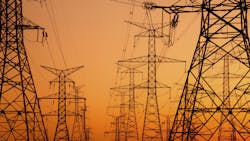Department of Energy Releases Report on U.S. Grid Reliability and Security
The U.S. Department of Energy (DOE) has released its Report on Evaluating U.S. Grid Reliability and Security, which fulfills Section 3(b) of Executive Order 13990, Strengthening the Reliability and Security of the United States Electric Grid. The report presents a standardized methodology to assess regional grid vulnerabilities and guide potential federal interventions aimed at maintaining reliable electricity service.
The report analyzes current and projected electricity system conditions across the country, highlighting concerns about resource adequacy in the face of increasing demand — particularly from artificial intelligence (AI) technologies and data center growth — as well as the retirement of existing power generation facilities and delays in adding new firm capacity.
“This report affirms what we already know: The United States cannot afford to continue down the unstable and dangerous path of energy subtraction previous leaders pursued, forcing the closure of baseload power sources like coal and natural gas,” said Secretary of Energy David Wright. “In the coming years, America’s reindustrialization and the AI race will require a significantly larger supply of around-the-clock, reliable, and uninterrupted power. President Trump’s administration is committed to advancing a strategy of energy addition, and supporting all forms of energy that are affordable, reliable, and secure. If we are going to keep the lights on, win the AI race, and keep electricity prices from skyrocketing, the United States must unleash American energy.”
Key findings from the report include:
-
Resource adequacy is a growing concern. If current trends in generator retirements and planned capacity additions persist, most regions of the country could face increased reliability risks within five years. The report notes that current plans may not be sufficient to meet future demand from AI-driven data centers, manufacturing growth, and electrification, all while maintaining affordable electricity for consumers.
-
Electricity demand is accelerating. The report projects significant increases in electricity use, particularly from emerging technologies and industrial applications. This load growth is expected to outpace the ability of existing planning and infrastructure to accommodate new demand.
-
Risk of outages may rise sharply. Modeling indicates that if 104 gigawatts (GW) of firm generation retire by 2030 without adequate replacement, the frequency and duration of outages could rise dramatically — potentially increasing by a factor of 100. Under certain scenarios, the report estimates outage hours could rise from single digits today to over 800 hours annually.
-
New capacity additions lack firm reliability. While 209 GW of new generation is expected to come online by 2030, only 22 GW is projected to be firm baseload generation. Even with no retirements, the report finds that several regions could still face elevated outage risks, indicating that planned additions may not adequately address system needs.
-
Updated planning methods are necessary. The report emphasizes that current approaches to evaluating resource adequacy — especially those focused on peak load periods — do not fully reflect today’s grid dynamics, including interregional dependencies. It calls for integrated models that account for outage frequency, duration, and geographic spread.
The DOE’s methodology also identifies regional risk profiles under varying weather and capacity scenarios and outlines target capacity additions needed to meet acceptable reliability standards. The findings are intended to inform potential future use of DOE’s emergency authority under Section 202(c) of the Federal Power Act.
